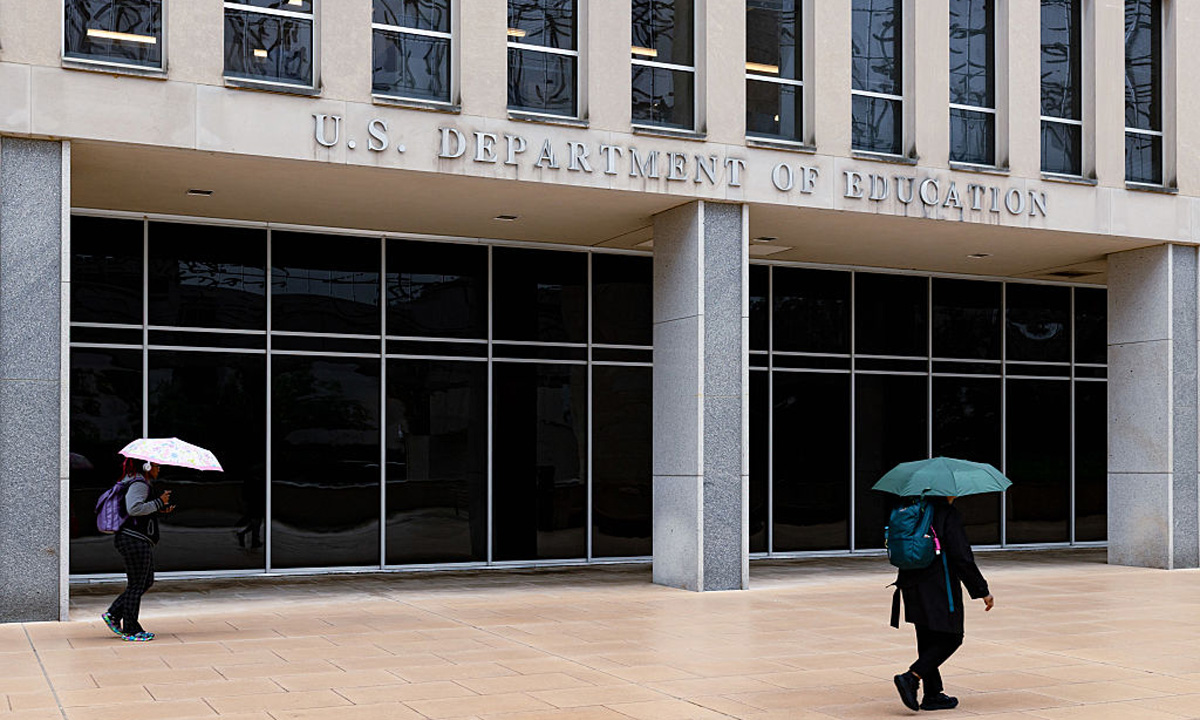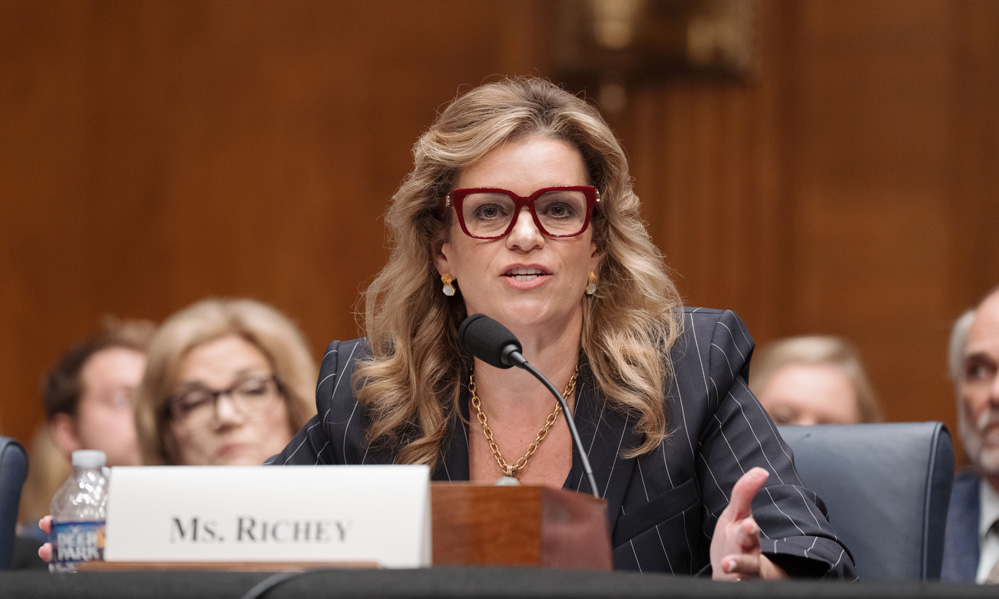Despite Court Order, Education Department’s Civil Rights Staff Still On Leave
Officials have asked the court to throw out the order. Meanwhile, students have been left ‘without recourse for discrimination,’ attorneys say.

Get stories like this delivered straight to your inbox. Sign up for The 74 Newsletter
It’s been more than a month and a half since a federal judge ordered Education Secretary Linda McMahon to put Office for Civil Rights staff back to work. But so far, none of the 276 fired employees are back on the job.
Advocates say the reduction in staff has contributed to a backlog of untouched complaints, leading students to wonder whether their cases have been abandoned.
“The people who turn to OCR are the students who feel really betrayed by their own institutions or by their own school districts and often feel like they’re at the end of the road,” said Amanda Walsh, deputy director of external affairs for the Victim Rights Law Center, a legal advocacy group that’s part the case. The Boston OCR office, one of seven shuttered in the downsizing, was handling complaints from the victims of sexual assault they represent. Now, Walsh said, they have no information on the status of those cases. “We’ve proactively reached out to OCR for updates and have received no responses.”
The administration says that because the U.S. Supreme Court allowed the secretary to permanently fire over 1,000 staffers from other divisions in the agency, she should be free to dismiss OCR employees as well.
The two cases are “functionally identical,” the government’s lawyers wrote in a July 21 request to the court. They said that the district court should throw out the June 18 order requiring McMahon to reinstate OCR’s attorneys, investigators and other support staff.
Attorneys for the Victim Rights Law Center and the two families who sued say their case is significantly different. Their clients — and those in similar situations nationwide — have pending complaints that have been left in limbo or dismissed because of the staff reduction.
One Black student in the suit, identified as T.R., faced racial discrimination from peers in the Falls City, Nebraska, district. They called him a “monkey” and the n-word. A.J. from Birmingham, Michigan, another plaintiff, has a life-threatening dairy allergy. Students poured milk on his lunch and put cheese on his head. Tara Blunt, T.R.’s mother, withdrew him from school in 2023. A.J.’s mother, Karen Josefosky, pulled her son out the following year.
Firing OCR staff “stalled civil rights investigations across the country and left thousands of students, including plaintiffs, without recourse for discrimination in school,” attorneys for the plaintiffs wrote in a brief last week opposing the administration’s request.
The delay in putting OCR staff back to work is just one example of the Trump administration’s failure to comply with about a third of the court orders issued against it, according to a recent Washington Post analysis of 337 lawsuits.
Rachel Oglesby, chief of staff at the Education Department, files weekly updates to Judge Myong Joun, with the Massachusetts district court, about the department’s progress toward reinstating the staff. But her statements list multiple reasons why the department has not acceded to the court’s wishes. Officials, she wrote, are still calculating whether there’s sufficient office space and discussing “the feasibility” of restoring employees’ access to computer systems. In the meantime, the department is paying the staff about $1 million a week while they’re out of work, she said.
One OCR attorney still on the job said the layoffs have made it nearly impossible to address all of the complaints submitted.
“One person now has to do the work of three,” said the attorney, who asked to remain anonymous out of fear of retaliation. “There’s just not enough physical time in the day.”
Joun didn’t give the department a hard deadline for staff to return to work. He just said McMahon had to “take all steps necessary to facilitate the return to duty” of those terminated and continue to investigate all complaints.
That choice of words allows the agency to appear to be meeting the court’s terms, said David Super, a constitutional law professor at Georgetown University.
“When you use language like ‘facilitate the return,’ … you certainly invite the administration to drag its feet,” he said. “After a week or two, if nothing meaningful is happening, that’s probably the time to consider whether clearer language is needed.”
The department’s slow progress in getting OCR staff back to work is similar to the strategy it followed in the Supreme Court case brought by blue states and a group of districts and unions.
On May 22, Joun, the Biden appointee presiding over both cases, temporarily halted the department from firing staff. The U.S. Appeals Court for the First Circuit upheld the ruling two weeks later. The department appealed, asking the Supreme Court to allow the firings to go forward while the case continues in Joun’s court.
The dismissed staff members never returned to work. Aug. 1 was their official last day.
With an administration unafraid to defy the courts, some legal experts question why judges haven’t used stronger measures to force compliance. District courts can hold government officials in contempt and enforce penalties, sanctions and even jail time. In 2019, a judge fined former Education Secretary Betsy DeVos $100,000 because she wouldn’t stop collecting loan payments from students defrauded by a for-profit college that went out of business.
In the Clinton and George W. Bush administrations, a district court held Department of the Interior officials in contempt for not paying Native Americans past royalties on oil, timber and other resources. This year, a District of Columbia circuit court judge found cause to hold Trump in contempt for not returning deportees sent to El Salvador back to the U.S. In July, the men were sent to Venezuela, their home country.
But appellate courts rarely uphold lower-court sanctions against administration officials, Nicholas Parrillo, a Yale University law professor, wrote in 2018. On Friday, the District of Columbia Circuit Court of Appeals dismissed the contempt proceedings against Trump.
Georgetown’s Super noted that the current Supreme Court, which has backed much of Trump’s agenda, has discouraged district judges from coming down hard on the administration.
The justices have “fired several shots across the lower courts’ bows, suggesting that they should be less forceful in enforcing their orders,” he said. “They haven’t made a single sweeping statement; they’ve just nitpicked the cases that have come to them.”
Despite noncompliance, federal agencies traditionally try to keep the courts happy by demonstrating “some steady progress,” Parrillo wrote.
In her latest report filed Tuesday, Oglesby said a committee met the day before to discuss “reintegration activities.” Officials mailed 365 boxes to employees to return their old laptops before the department issues them updated equipment.
On July 30, she said there’s available space for employees in the Dallas regional office. But there’s not enough room in Boston, Philadelphia and San Francisco. She’s not sure about Chicago; the New York office is under renovation.
Oglesby’s rationale doesn’t satisfy Terri Gonzales, a chief attorney who managed the Dallas office. She doesn’t understand why the department didn’t allow the staff to start working from home weeks ago.
“For approximately a full year during the COVID-19 pandemic, almost the entire staff of the OCR Dallas office worked remotely,” she wrote in a statement to the court. “There is no reason why staff members could not do the same now.”
The department, she added, could have taken “common sense” measures to get the ball rolling, like providing staff with contact information for new supervisors and training them on any new procedures enacted while they’ve been on leave.
The department did not respond to questions about why OCR staff aren’t working remotely.
‘Cause for grave concern’
OCR is still under the leadership of Craig Trainor, who worked for the America First Policy Institute, the MAGA think tank McMahon chaired, until Trump appointed him acting assistant secretary. He’s awaiting confirmation for a post in the Department of Housing and Urban Development. But like Kimberly Richey, Trump’s choice to lead OCR, Trainor’s nomination is stalled while Congress takes an August break.

Trump last week pressured the Senate to advance dozens of his nominees, but a deal with Democrats fell apart before the recess.
Under Trainor, OCR has received nearly 6,500 complaints since the March mass layoffs and dismissed about 4,500 of them, Oglesby wrote. The office resolved 385 complaints and opened 377 investigations. They include one involving the Cupertino district in California requiring officials to clarify that service dogs are allowed at school. Another focuses on ensuring a Boulder Valley, Colorado, student with ADHD receives extra time on tests and other accommodations spelled out in his disability plan.
In a third example, the Detroit district agreed to fix an elevator at one of its elementary schools and ensure that no students, parents or staff with disabilities miss out on programs or services that require use of the elevator.
An investigation into complaints over services for students with disabilities in the District of Columbia Public Schools is “actively being investigated,” added the current OCR attorney who asked not to be named.
In the past, the staff would have cleared about 200 complaints a month, Gonzales wrote.
“The low reported number of substantive resolutions contrasted with the high number of dismissals is a cause for grave concern,” she told the court. “Based on my experience, it suggests that OCR is not completing investigations promptly and fairly.”
Get stories like these delivered straight to your inbox. Sign up for The 74 Newsletter

;)
